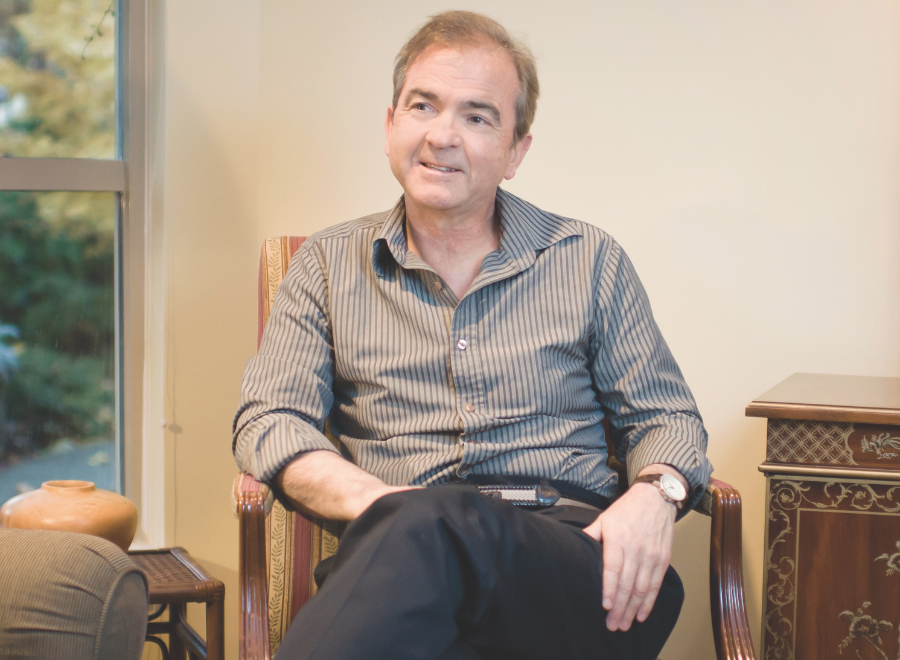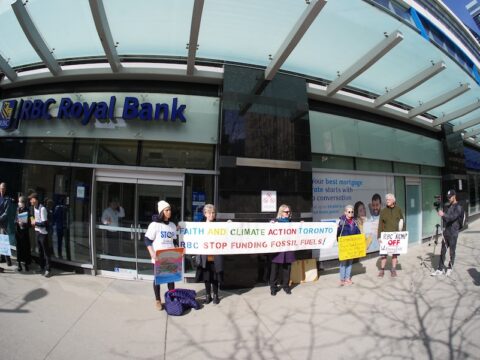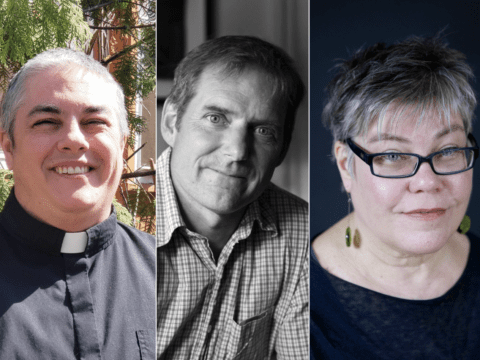Douglas Todd, of the Vancouver Sun, could easily slide into obscurity. Instead, his blog The Search is a hub for the city’s deep questions. He spoke to Pieta Woolley in Vancouver.
Pieta Woolley: The great fear among newspaper honchos and book publishers is that many people — especially young people — have stopped reading. What’s lost spiritually when people stop reading seriously?
You may unsubscribe from any of our newsletters at any time.
Doug Todd: I think it’s that loss of reflective time. In the era of tweets and texting, you don’t even know what you’re thinking or feeling half the time because you’re so buffeted by stimuli. You lose silence. The last few years, I’ve taken these eight-day silent retreats. They’re fantastic. I mean, it’s a little frightening, actually, to be alone with your thoughts. It’s usually hell until the third day, as you do confront certain parts of yourself. For me, I get this incredible sense of the sacred by turning off all those electronic things, including not doing too much reading, because that can be a distraction. Reading generally does help you become a more reflective person. But salvation also doesn’t lie in books.
PW: The flip side, as you point out in your blog, is poor religious literacy. One of your posts was about the difference between evangelical conservatives and liberal Christians — a fairly basic distinction for anyone with some cultural knowledge.
DT: Yes, that was my desperate attempt to try to get very straightforward about this. There are differences, folks.
Most people do not actually know there is such a thing as a liberal church, especially in B.C. I don’t actively promote it, but I do try to say, “There is this option, gang. Intellectual Christian theology is out there. It’s in dialogue with other religions, with science, with environmentalism.” I actually think the United Church, with all its flaws, is a pretty happening place intellectually. So is the Anglican Church and so is the Lutheran Church.
PW: To me, the point of church is that it offers connection with God. You’d think the superficial judgments some people make about the church would be overridden by the stronger desire to have that fundamental hunger met. What’s happened?
DT: I think people are afraid. You might learn some things about yourself that aren’t super pleasant at church, like maybe you’re imperfect and you’re not that open to things that are real. It’s so easy to be distracted by popular culture and your worries. So I actually find an almost bloody-minded kind of denial in people. They don’t want to know there’s an option.
PW: How did you come to that conclusion?
DT: This is one of my pet peeves in B.C. Half of my friends say, “I’m kind of a Buddhist.” And I say, “Do you ever go to temple?” They wouldn’t even think about it. They just heard something nice that the Dalai Lama said about happiness, and they think they’re a Buddhist. It’s so superficial, it’s painful. Religion is hard work. I really like [British religion writer] Karen Armstrong, who wrote A Case for God. She said, “People keep complaining to me, ‘Your books are so difficult.’” She responded, “Yes, of course they’re difficult. They’re about God.” I’m not totally against simple faith, but I think this God stuff is quite complicated intellectually.
PW: Should institutions like the United Church ask public boards of education to put religious curricula back into schools as an antidote to religious illiteracy?
DT: Yes, somebody should. There should definitely be religion taught in schools with an emphasis on Christianity, but not exclusively by any means. Christianity is our tradition, and it’s what most people say they are in Canada by a country mile, 60 or 70 percent. In Denmark, you take a course a day in some sort of religious knowledge. It’s a secular country, but at least they know what they’re rejecting.
In B.C., the only religious studies class is in Grade 8. And nearly all the young people I know say it’s one of the best courses they’ve ever taken. Kids are interested in this stuff, but there’s this fear in the public school system of being seen to be promoting religion.
PW: You seem to have a love-hate relationship with the spiritual-but-not-religious set.
DT: The fact is, liberal churches need to engage the spiritual-but-not-religious. This is actually mainstream spiritual culture in B.C. It’s the way that North America’s going. The church could become a more creative and interesting place intellectually if it tries to appeal to the intelligent spiritual-but-not-religious and help them get over their phobia about institutions.
PW: In your 2009 book Cascadia: The Elusive Utopia, you point out that the church as we know it is in real trouble, and that British Columbia is the canary in the secular coalmine. Where’s the hope?
DT: We’re a place that is very anti-institutional, so the individualistic thing is very strong here. If churches survive, it’s because of the charisma of the leaders — not because people are proud to be United Church or proud to be Anglican or something like that. The drawback is, does the congregation go when the charismatic leader leaves the church? So that’s not a long-term solution.
PW: What is the long-term solution?
DT: The churches can learn from the spiritual-but-not-religious set. I know some of it’s flaky and magical thinking — “Oh, if I practise mindfulness, I’ll have instant happiness.” But there is stuff to learn from what’s going on in meditation, yoga, tai chi. I think those are ways to get away from the culture of distraction.
One thing I recommend is that churches offer more spiritual practices. Kolin Lymworth, the founder of the alternative-spirituality bookstore Banyen Books, for example, is not that interested in Christianity. He’s interested in everything else in the world, from ayahuasca [a plant-based brew used in shamanic trances] to sacred dancing.
He’s not interested in the Christian church because he doesn’t think they offer any spiritual practices, which is sort of half-true. You know, singing a hymn is a spiritual practice — there are a lot of definitions. I do yoga, meditation, centring prayer. All this kind of stuff could be more promoted by Christian churches. It’s there, it’s part of the tradition, but it’s still minor in a lot of places.
PW: Ultimately, what’s your vision for liberal churches?
DT: With deeper philosophy and theosophy, churches can become real intellectual hubs. And that’s not for everybody, but it could be for a lot of people. You have to be able to justify on a rational basis why your theology makes sense and why [atheist author Richard] Dawkins is wrong, and be able to spell it out rather than just getting angry. And I have another funny idea: encourage more testimonials. I think those evangelical testimonials really work.
PW: They’re amazing.
DT: They are. They’re very moving. They can be horribly clichéd or saccharine sometimes, but there’s no reason they can’t be brought into the liberal church. I’ve seen some where people talk about how the church has helped them overcome their addiction or their anorexia or their loneliness. It just blows your mind. What’s wrong with that? That’s good stuff.
PW: Can I ask you another horrible question?
DT: Sure. That’s what I always do.
PW: The charismatic leaders I can think of in the United Church and nearly every other church are all men.
DT: Oh gosh. Don’t get me going on that.
***
This story first appeared in The United Church Observer’s May 2012 issue with the title “‘Liberal churches need to engage the spiritual-but-not-religious set’”













